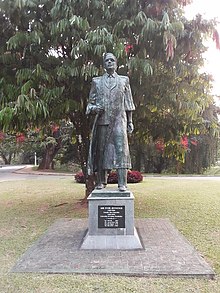Ivor Jennings
Sir Ivor Jennings QC FBA | |
|---|---|
 | |
| Vice Chancellor of University of Ceylon | |
| In office 1942–1954 | |
| Preceded by | None |
| Succeeded by | Sir Nicholas Attygalle |
| Personal details | |
| Born | 16 May 1903 academic |
Sir William Ivor Jennings
Education
Jennings was educated at Queen Elizabeth's Hospital, Bristol (a boarding school), at Bristol Grammar School, and at St Catharine's College, Cambridge.[1]
Career
Jennings joined the University of Leeds as a lecturer in law in 1925 and became a Holt Scholar of Gray's Inn and was called to the bar in 1928. The following year he joined the London School of Economics as lecturer in law.
Jennings was sent to
He was knighted in 1948, made a King's Counsel in 1949, and awarded the KBE in 1955. In 1955, Jennings received an honorary doctorate by vote of the senate of the University of Ceylon to recognize his work in creating and building the institution. A hall of residence at the University of Peradeniya is named in his honour.
In the same year (1955) he returned to Britain to take up the post of Master of Trinity Hall, Cambridge. He subsequently served a term as Vice-Chancellor of the University of Cambridge, a position which at that time rotated among the heads of the colleges.
Jennings married Helen Emily Konsalik in 1928 and had two daughters, Shirley (Jennings) Watson and Claire (Jennings) Dewing. Together with his wife and daughter Claire, he was aboard the MS Lakonia, a Greek-owned cruise ship, when it caught fire and sank north of Madeira on 22 December 1963, with the loss of 128 lives.
Constitutional law

Jennings was an authority on
He was a member of the Reid Commission from June 1956 to 1957, which was responsible for drafting the Constitution of the Federation of Malaya (now Malaysia).
In 1959, he was an advisor to the committee to draft the constitution of Nepal, which was named "Constitution of the Kingdom of Nepal,1959."
Partial bibliography
- The Road to Peradeniya
- Constitutional Laws of the British Empire (1938), later reissued as Constitutional Laws of the Commonwealth (1957)
- Parliament (1939)
- A Federation for Western Europe (1940)
- Party Politics (1955)
- The Approach to Self-Government
- The Law and the Constitution (5th Edition) (1959)
- Principles of Local Government Law (4th Edition) (1960)
- The British Commonwealth of Nations (1st Ed. 1948, 2nd Ed. 1954, 3rd. Ed. 1956, 4th Revised Ed. 1961)
- Cabinet Government (3rd Edition) (1965)
- The British Constitution (5th Edition) (1966)
See also
- University of Ceylon
- List of Vice-Chancellors of the University of Cambridge
- College House: The Cradle of Sri Lanka's University Education (2021) Edited by Sandagomi Coperahewa & Shravika Amarasekera. Published by University of Colombo.
References
- doi:10.1093/ref:odnb/34181. (Subscription or UK public library membershiprequired.)
- ^ "Ivor Jennings saga in Ceylon during World War II". LankaLibrary. 2005. Retrieved 10 June 2010.
- ^ "Sir Ivor: First Vice Chancellor of University of Ceylon". Rootsweb. 2003. Retrieved 10 June 2010.
- ^ First Vice Chancellor of University of Ceylon
- ^ "Sir Ivor Jennings: The multifaceted educationist". Archived from the original on 5 April 2008. Retrieved 4 June 2013.
